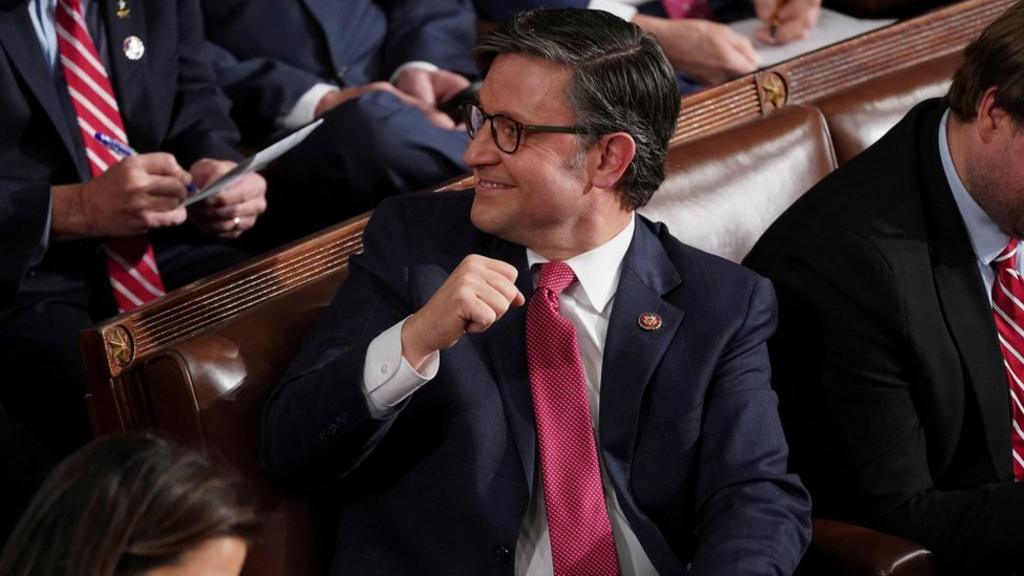
US Speaker of the House Mike Johnson, a Republican from Louisiana, faces another critical challenge as the 119th Congress convenes. While his position as Speaker has the endorsement of President-elect Donald Trump, Johnson’s fate ultimately lies in the hands of House Republicans. Discontent among far-right members of his party highlights the ongoing struggle for unity within the GOP.
Speaker Election Underway
The speaker election began with House Republican Conference Chair Lisa McClain nominating Mike Johnson for the role. Democrats, meanwhile, reaffirmed their support for Rep. Hakeem Jeffries, D-N.Y., as their leader following the party’s recent electoral setbacks.
What Happens During the Election?
- Nominations: After confirming a quorum—the minimum number of members required—nominations are made for the position of Speaker. Although Johnson was selected as the GOP nominee in a November closed-door vote, members are not bound to vote for their party’s choice. Any member of the House can be nominated.
- Voting: The voting process involves a roll call, where members verbally state their choice. This procedure, while traditional, can be lengthy and sometimes theatrical.
- Results: A candidate must secure a majority of votes from those present and voting. If no candidate meets this threshold, additional rounds of voting ensue until a majority is achieved.
Challenges for Mike Johnson
With a slim 220-215 majority, Johnson cannot afford significant defections. The resignation of Rep. Matt Gaetz of Florida has further reduced the GOP’s margin, intensifying the pressure. Despite his optimism, Johnson faced resistance from some far-right Republicans dissatisfied with his leadership.
Key Factors to Watch:
- Republican Unity: Johnson’s ability to rally his party could determine not just his position but also the trajectory of the GOP’s legislative agenda.
- Democratic Opposition: Democrats, led by Hakeem Jeffries, are expected to present a unified front, leaving Johnson reliant on near-unanimous Republican support.
Historical Context
The speakership has been vacant only 13 times in U.S. history. While a Speaker is typically elected at the start of a new Congress, the process can become contentious. Notably, it took Kevin McCarthy 15 rounds of voting to secure the position two years ago.
A Day of Firsts
Beyond the Speaker election, the 119th Congress marks several historic milestones:
- Senate Milestones: For the first time, two Black women, Lisa Blunt Rochester of Delaware and Angela Alsobrooks of Maryland, will serve as senators simultaneously. Andy Kim of New Jersey also becomes the first Korean American senator.
- House Representation: Sarah McBride joins as the first openly transgender member of Congress, further diversifying the legislative body.
Mike Johnson Leadership Message
Ahead of the vote, Johnson emphasized the importance of unity, stating, “We need to move forward with the America First agenda.” He dismissed claims of backroom deals, asserting his focus on making the institution work efficiently.
Implications for Trump’s Agenda
The Speaker’s election carries significant implications for President-elect Trump’s policy goals, including tax reforms and immigration measures. A prolonged leadership battle could disrupt the certification of Trump’s 2024 election victory, underscoring the high stakes.
Festive Atmosphere Turns Serious
As lawmakers gathered with their families on the House floor, the mood shifted from celebratory to solemn as the roll call began. Johnson, backed by Trump, hopes to secure the gavel in the first round of voting, avoiding the protracted process seen in previous elections.
The outcome of this election will shape the future of the 119th Congress, testing Johnson’s leadership and the GOP’s ability to govern effectively. Whether Johnson emerges victorious or faces further challenges, the battle for Speaker highlights the complexities of modern U.S. politics.

